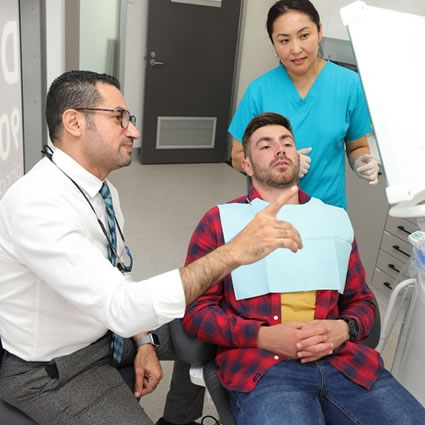
Tooth Extractions in
Docklands, Melbourne
Tooth extractions should always be performed by a trusted and competent dentist like Pinnacle Dental. We fully understand how to perform the procedure and are the best in the business. Tooth removal is reasonably commonplace in the realm of dentistry and may be required for a multitude of reasons. We take a caring and compassionate approach towards tooth extraction to make your experience a pleasant one.
Why Choose Us?
- We are committed to educating you and your family about the importance of developing good oral hygiene habits.
- In addition to tooth extractions, we offer a wide range of dental services and procedures.
- Our transparent pricing and flexible payment options make your treatment more affordable.
- We are a professional dental team with many years of experience in dealing with tooth extractions for children and adults.
- Our expert team will cater to all of your needs and make you feel like more than a patient.
- We have ample parking and are easily accessible by public transport.
- We offer flexible appointment times to suit you and your family.
- You can rest assured that you will receive the best treatment available for your chosen procedure.

The Process
When the time comes for the extraction, a local anaesthetic will be administered to numb the affected tooth, along with the surrounding areas. While rarely necessary, general anaesthesia is sometimes used in cases of wisdom tooth removal. If that’s the case, you will have to be admitted to hospital—although you can still go home the same day.
There are two types of tooth extraction procedures, depending on the condition of the tooth:
- Simple: In this procedure, once the tooth and surrounding areas are numb after the anaesthesia has been administered, the dentist uses a tool known as an elevator to loosen the tooth. The elevator helps break down the tissues that support the tooth and expand the socket that holds the tooth. The dentist then uses a pair of forceps to easily pull out the tooth. You might experience some pressure when the tooth is being pulled out, but typically, there is no pain. The dentist will then place a gauze over the empty socket and ask you to bite down on it to stop the bleeding.
- Surgical: With this procedure, the dental surgeon makes a small incision on the gum to access the affected tooth. If the tooth is too large, it may be broken into small pieces for easier removal. If the extraction is for an impacted tooth, the dental surgeon will cut away some bone and gum tissue, and then use forceps to rock the tooth, loosen it from the jaw bone, and pull it out. In some instances, the dentist may bring the gum edges together after the surgical extraction and stitch them. The stitches will dissolve automatically within a few days.
Frequently Asked Questions
What should I expect during the procedure?
What is the recovery time afterwards?
How can I care for my mouth after the tooth removal?
When Is Tooth Removal Needed?
Tooth extraction is important for addressing various oral health problems such as injury or trauma, disease, and crowding. It is a necessary procedure for treating certain diseases such as muscular spasms, gum infection, or an infection of the facial nerves known as Trigeminal Neuralgia. Determining the severity of the tooth infection determines whether tooth extraction is necessary or not.
Wisdom tooth removal is important when it comes to addressing the problem of teeth crowding in the mouth after the growth of wisdom teeth. However, not all wisdom teeth need to be extracted. This will only be required if they impact other teeth, don’t come through naturally on their own, come through at a strange angle, or are difficult to clean and maintain.
Who Needs a Tooth Extraction?
This service is usually recommended if you have a tooth that has suffered too much damage from trauma or decay to be repairable. Other reasons include:
Schedule Today
Contact us today to book an appointment with our experienced dental team.
CONTACT US
Any invasive or surgical procedure may carry risks. Before moving forward, it is recommended that you seek a second opinion from an appropriately licensed medical professional.

